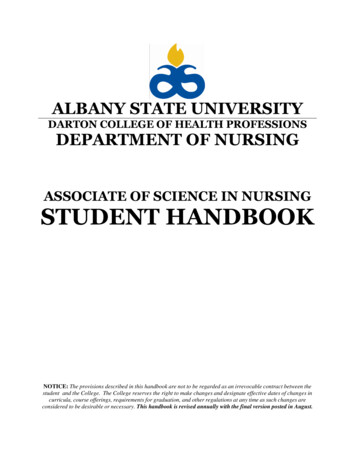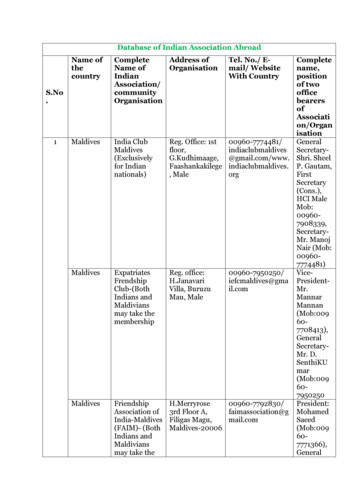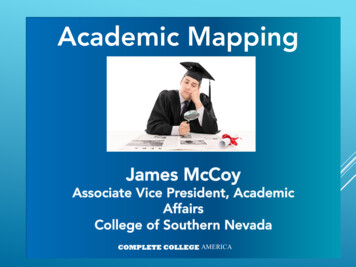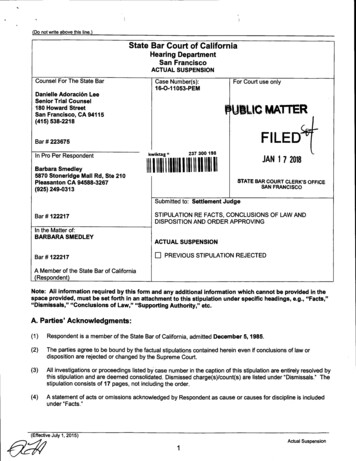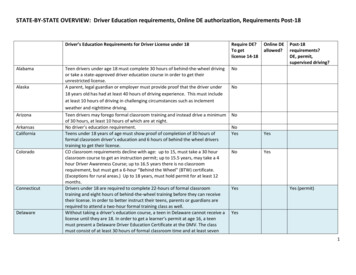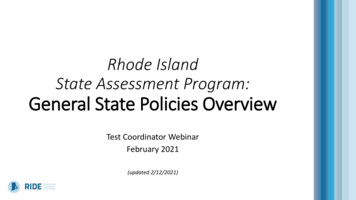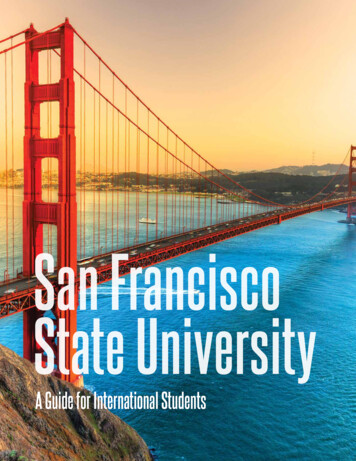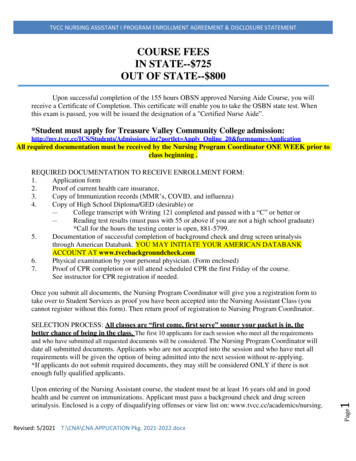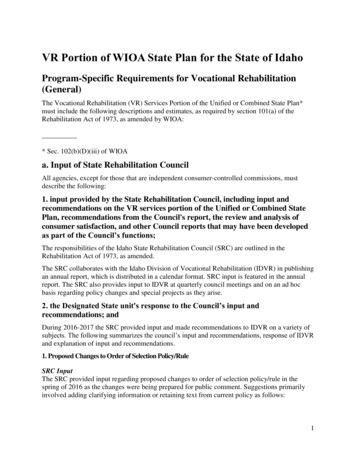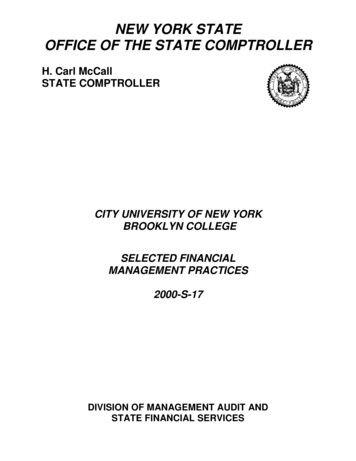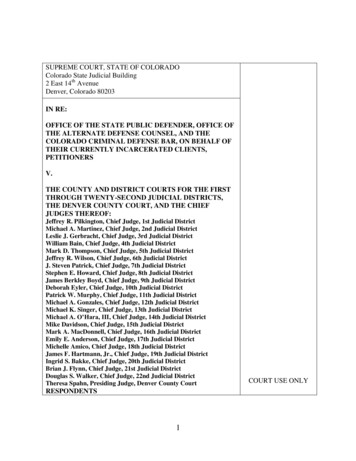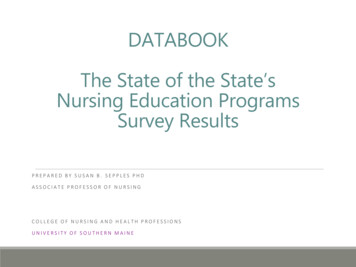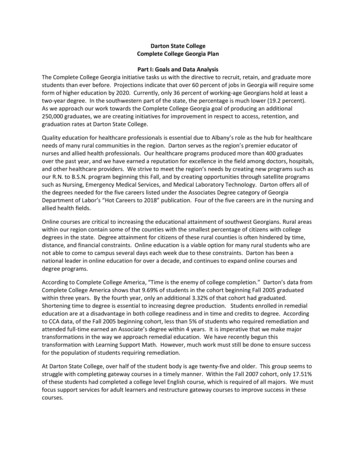
Transcription
Darton State CollegeComplete College Georgia PlanPart I: Goals and Data AnalysisThe Complete College Georgia initiative tasks us with the directive to recruit, retain, and graduate morestudents than ever before. Projections indicate that over 60 percent of jobs in Georgia will require someform of higher education by 2020. Currently, only 36 percent of working-age Georgians hold at least atwo-year degree. In the southwestern part of the state, the percentage is much lower (19.2 percent).As we approach our work towards the Complete College Georgia goal of producing an additional250,000 graduates, we are creating initiatives for improvement in respect to access, retention, andgraduation rates at Darton State College.Quality education for healthcare professionals is essential due to Albany’s role as the hub for healthcareneeds of many rural communities in the region. Darton serves as the region’s premier educator ofnurses and allied health professionals. Our healthcare programs produced more than 400 graduatesover the past year, and we have earned a reputation for excellence in the field among doctors, hospitals,and other healthcare providers. We strive to meet the region’s needs by creating new programs such asour R.N. to B.S.N. program beginning this Fall, and by creating opportunities through satellite programssuch as Nursing, Emergency Medical Services, and Medical Laboratory Technology. Darton offers all ofthe degrees needed for the five careers listed under the Associates Degree category of GeorgiaDepartment of Labor’s “Hot Careers to 2018” publication. Four of the five careers are in the nursing andallied health fields.Online courses are critical to increasing the educational attainment of southwest Georgians. Rural areaswithin our region contain some of the counties with the smallest percentage of citizens with collegedegrees in the state. Degree attainment for citizens of these rural counties is often hindered by time,distance, and financial constraints. Online education is a viable option for many rural students who arenot able to come to campus several days each week due to these constraints. Darton has been anational leader in online education for over a decade, and continues to expand online courses anddegree programs.According to Complete College America, “Time is the enemy of college completion.” Darton’s data fromComplete College America shows that 9.69% of students in the cohort beginning Fall 2005 graduatedwithin three years. By the fourth year, only an additional 3.32% of that cohort had graduated.Shortening time to degree is essential to increasing degree production. Students enrolled in remedialeducation are at a disadvantage in both college readiness and in time and credits to degree. Accordingto CCA data, of the Fall 2005 beginning cohort, less than 5% of students who required remediation andattended full-time earned an Associate’s degree within 4 years. It is imperative that we make majortransformations in the way we approach remedial education. We have recently begun thistransformation with Learning Support Math. However, much work must still be done to ensure successfor the population of students requiring remediation.At Darton State College, over half of the student body is age twenty-five and older. This group seems tostruggle with completing gateway courses in a timely manner. Within the Fall 2007 cohort, only 17.51%of these students had completed a college level English course, which is required of all majors. We mustfocus support services for adult learners and restructure gateway courses to improve success in thesecourses.
The Complete College America data was extremely helpful. However, data that included a number lessthan ten was suppressed. We found that this was sometimes misleading in analysis of the data. Forexample, much of our data was suppressed for the 20-24 year old age group, making it nearly impossibleto compare that group with the others. Because suppressed data shows as zero on charts, it oftenappears as though that group is performing poorly when they could, in fact, be out-performing othergroups. Without the suppressed data, there is no way to compare. We encountered this problemfrequently among several demographic groups.Part II: Strategies and Objectives and Part III: Planning and ImplementationSpecific initiatives and the goals to which they relate are listed below, along with information regardingthe planning and implementation of these objectives.CCG Goal: Shorten time to degreeInitiative: Increase student use of our Credit by Exam optionCredit by examination (CBE) is an easy way for students who have prior knowledge to obtaincredit for a course. At Darton State College, we currently offer a CBE program. Additionally,these exams are offered to students at no cost. This particular initiative falls well within thescope of the mission of CCG, as it provides affordable, fast, and convenient ways for students towork toward completion of their degree programs. However, what we do not do well isadvertise this option for our students or provide a centralized place for them to view the CBEoptions.To enhance the usage of our CBE programs and to further assist students, we will create adatabase of CBE by division and advertise this option to students during our advising andregistration periods. This marketing approach will focus on three different constituencies, asinformation will be disseminated to advisors, students, and potential students. Making studentsmore aware of this option will allow for great strides to be made toward early or on-timecompletion. Both the database and our marketing approaches will be completed by January2013. We hope that this increase in student and advisor knowledge of this option will have asignificant impact on degree completion.CCG Goal: Shorten time to degreeInitiative: Award Prior Learning Assessment (PLA) Credit to studentsAccording to Georgia’s Higher Education Completion Plan 2012, nearly 1 million workingGeorgians, 22 percent of those in the workforce, have earned some college credit, but have notcompleted a degree, and more than 780,000 veterans live in the state. It is our belief that manyof these adults would return to school and begin or complete their education if they understoodthe options available to them and were supplied with the knowledge of where and how to start.One such option is prior learning assessment (PLA). PLA allows adult learners to earn collegecredit for what they already know, thereby decreasing time to graduation and tuition cost.There are several methods to achieve prior learning assessment including CLEP exams, challengeexams, and portfolio submission. Darton State College is actively implementing and grantingprior learning credit through CLEP and challenge exams. A more comprehensive policyaddressing challenge exams across disciplines should be determined and administered by Fall2013. The portfolio submission process for prior learning credit is missing from Darton StateCollege.The Council for Adult and Experiential Learning (CAEL) conducts a series of workshops to providetraining for college personnel who are interested in acquiring the knowledge base for assessingportfolio submissions for PLA credit. By Fall 2013, Darton State College will have faculty trained
to conduct assessments on portfolio submissions. Also, by Fall 2013, Darton State College willhave policies and procedures in place for awarding PLA credit through portfolio submission. Thecomprehensive approach to prior learning assessment that will be completed by Fall 2013should be evaluated by an appointed faculty committee and the Director of Military and AdultLearning annually to determine any changes that may be necessary to ensure that credit isawarded consistently and accurately.CCG Goal: Shorten time to degreeInitiative: Enhance academic planningPerhaps the most common-sense approach to shortening time to degree is establishing a planfor completion. Clear and concise term-by-term plans help students make completion the goaland help them avoid aimless academic pursuits. Although our first-time freshmen are requiredto develop an academic plan as part of the First Year Experience course, these pen-and-paperplans are rarely kept and utilized by students and advisors. To enhance academic planning andensure that plans are updated by students and tracked by advisors, we will implementDegreeWorks software which has a robust planning feature. Advisors and FYE faculty will betrained initially during Faculty/Staff Development Days and on an ongoing basis after initialimplementation. We will continue to utilize the FYE course to train first-time freshmen on thesoftware and assist them in developing their initial completion plan.CCG Goal: Shorten time to degree and increase participation with K-12 institutionsInitiative: Increase participation in our ACCEL and Move on When Ready (MOWR) programAs part of the Georgia Department of Education’s goal to increase post high school readiness,Georgia school systems will be evaluated based on the College and Career Ready PerformanceIndex (CCRPI) beginning with the 2013-2014 school year. One of the indexes for evaluationrequires a percentage of the school systems’ graduates to earn high school credit via ACCEL,Dual Hope Grant, Move on When Ready (MOWR), Early College, Gateway to College, AdvancedPlacement courses, or International Baccalaureate courses. Moreover, with changes to theHOPE Scholarship Rigor Requirements, there will be an additional need for increasedparticipation in programs like those mentioned above.To help implement stronger partnerships with K-12 systems, Darton State College will work toincrease participation in its already strong ACCEL and MOWR programs by 15% by Fall 2013. Wewill work toward this initiative by providing more options for post-secondary institutions andhome school students. We will increase access to our courses by advertising our online andsatellite course offerings and will create partnerships with area schools to offer courses on theircampuses in English and other selected courses. We will work with area schools to promote theACCEL and MOWR programs by offering information sessions for parents, teachers, students,and administrators on our campus as well as at various high schools, and we will create acollaborative plan with school systems to help them achieve their CCRPI goals in this area.CCG Goal: Increase partnerships with K-12Initiative: Supporting Teachers through Training in Enhanced Methods (ST3EM)Darton State College has applied for a Mathematics and Science Partnership (MSP) ProgramGrant as the lead institution in partnership with Albany State University and Southwest GeorgiaRESA. The goal of the project is three-fold. First, to support teacher training that develops anunderstanding of the relationship between content knowledge, the curricular standards and theapplication of the two in classroom instruction; second, to enhance the ability of the teachers toapply the challenging academic content standards in project-based inquiry designed instruction;
and third, to develop a stronger collaboration between classroom practitioners and STEMfaculty. The project will focus on enhancing teacher content knowledge through face-to-facesessions with STEM faculty and online support on specific common core content.The faculty and RESA consultants will provide training on inquiry-based and project basedinstruction, designed around the integration of CCGPS and Next Generation Science standards.ESOL teachers and administrators are included in components of the training, with targetedassistance to address the specific needs of each group. The training is provided at regularintervals, with additional support provided by RESA between sessions. The inter-session timewill also include (1) mentor-mentee partnerships with the practitioners and STEM faculty, (2)application of project-based instructional activities that provide more rigorous mathematics andscience curricula, (3) ongoing administrator training, (4) use of online content support forclassroom practitioners, and (5) the development of practitioner-STEM faculty-student learningcommunities.CCG Goal: Improving access and completion for traditionally underserved studentsInitiative: Improve access to information and increase recruitment, retention, and graduation rates forpart-time, adult, and working studentsWith a majority of Darton’s students classified as non-traditional (52%), targeting this segmentof our student population through enhanced student services becomes critical in ensuring theirsuccess in college. Through improved marketing strategies for online courses, extending hoursof the Career Development Center, and providing additional tutoring support, we are breakingdown any additional barriers that may keep this segment of our students from attending andsucceeding in college.Distance learning options have been identified as a priority in the CCG Plan “in order to enableall students, especially working students, adult learners and military personnel to effectivelypursue college completion.” To reach this goal, Darton intends to increase Georgians’ awarenessof our online offerings. In Fall 2010, Darton served 3,196 students from the state of Georgia inonline course delivery. Of these students, only 1,033 (32%) were from outside of Darton StateCollege’s 14 county service area, highlighting the need for marketing throughout the state tobring a greater awareness of educational options accessible to adults through Darton StateCollege Online.It is essential for students to have clear-cut career goals that are consistent with both interestand aptitude in order to have a direction in college. The total number of students who did notreturn Fall Semester 2011 from Fall Semester 2010 was 2,729; this represents 46% of the FallSemester 2010 enrollment. For the period from Fall 2010 to Fall 2011, 227 undecided studentsdid not return. Sixty-two percent of undecided students, our fifth most common major, did notreturn. Career assessments such as the Strong Interest Inventory and the Myers-Briggs TypeIndicator help in this process of personal exploration. Currently, the Career DevelopmentCenter at Darton State College offers both assessments to its current students. We administered226 career assessments in 2010 and 184 assessments in 2011. With an additional staff member,we could extend the hours of the center and increase the number of tests that we canadminister.Darton’s low one-year retention rate shows we have a need for ten additional peer tutors tobring students up to speed academically and to help students develop internal resources. Datashowing the pass rates of students who were assigned a tutor indicate that peer tutors can helpimprove overall retention rates. At least one of the additional new peer tutors needs to be fornursing students to accommodate the needs of Darton’s largest major. Other peer tutors areneeded particularly for chemistry, anatomy, history, and accounting, courses for which we have
no lab or center. To implement this initiative, Peer Tutoring Center staff will work closely withfaculty members to recruit and train new tutors. Success will be assessed by an end-ofsemester check of grades of all Peer Tutoring Center clients. Clearly, additional peer tutors andexpanded hours for tutoring will give part-time, adult, and working students more access toacademic assistance, especially in gateway courses that lead to acceptance into our allied healthand nursing programs.This initiative will be implemented by developing a webpage specific to adult learners,implementing targeted marketing strategies, increasing the peer tutoring options, expandingthe Career Development Center hours, and by providing additional tutoring support for onlinestudents.Marketing strategies will include broadcast radio and television stations, new media, and webdelivered services such as “Keywords,” and “Display” campaigns that can be customized totarget specific demographic criteria and geographic areas such as rural towns or militaryinstallations within the state as well as the utilization of search engine optimization strategies,local newspapers and other local interest publications by placement of traditionaladvertisements and press releases focusing on local students who are achieving success inonline learning, and direct mail to potential adult learners in rural and metropolitan areas.Student success programs will also be expanded. The initiative to add 10 new peer tutors willhelp improve the retention and graduation rates of part-time, adult, and working students, aswell as military students. Additional tutoring support for online students will be exploredthrough options such as NetTutor or Ask Online, consulting with online faculty to determineareas of need and the wisest use of resources. The Career Development Center will extendoffice hours/days to accommodate both students and community members. These changes willrequire the hiring of an additional full-time Senior Administrative Assistant. Assessment willinclude tracking of student services utilization, as well as enrollment, retention, and graduationrates.CCG Goal: Improving access and completion for students in competitive programsInitiative: Offer an Associate of Science in Health ScienceCurrently, students who are not accepted to the career program of choice have very few choicesthat are favorable for the student. They have the following options:1. They may sit out of school for a year with the intentions of reapplying the following year.2. They may change majors or declare a double major that would allow them to remain inschool until they reapply the following year.3. They may simply drop out and never return, which sends a message of failure to thestudent.To increase the number of students who graduate, Darton State College has created anAssociate of Science in Health Science degree. Essentially, students who wish to apply to any ofthe allied health career programs declare Health Science as their major then choose a sub-areaof study (MLT, OTA, PTA, etc.) they wish to pursue. The degree in health science gives a studentwho wishes to complete an allied health degree at Darton State College the opportunity tocomplete any prerequisites required before applying to the career program of choice. If astudent gains acceptance to a career program, his or her major will be changed accordingly. If astudent is not accepted, he or she may continue taking classes to complete the degree in healthscience. The Associate of Science in Health Science is transferable to institutions of higherlearning. A student wishing to pursue a degree in a health related field requiring highereducation (physical therapy, occupational therapy, respiratory care, etc) may complete the two-
year degree at Darton State College then transfer to an institution of higher learning that offersadvanced degrees for his or her desired area of study.By offering an Associate of Science in Health Science,1. Students do not have to sit out of school for a year while waiting to reapply. If not acceptedto a career program, they still have an educational path to accomplish a two-year degree.2. They do not have to change majors or declare a double major because they are already on apath for a two-year degree that will not waste any credits already taken.3. The dropout rate after non-acceptance into a career program should decline becausestudents will have a successful path for accomplishing a two-year degree. This in turn willfoster success in our students and reflect on their feelings of self-worth.CCG Goal: Improving access and completion for traditionally underserved studentsInitiative: Improve access to information and increase recruitment, retention, and graduation rates formilitary studentsDuring Spring 2012, 243 military students and dependents were enrolled at Darton StateCollege, a 62% increase from
such as Nursing, Emergency Medical Services, and Medical Laboratory Technology. Darton offers all of the degrees needed for the five careers listed under the Associates Degree category of Georgia Department of Labor’s “Hot areers to 2018” publication. Four of the five careers are
